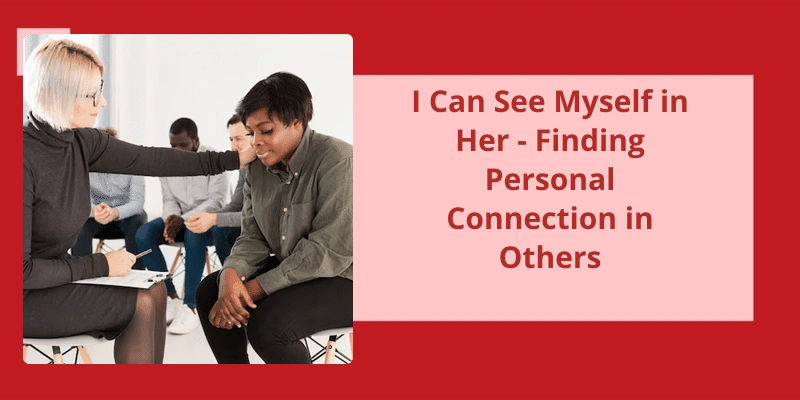"I can see myself in her" is a phrase that holds a special meaning for people. It's not just a mere statement, but rather a way of expressing how someone relates to another person. This phrase is often used when someone is impressed by another person's qualities, characteristics or viewpoints that resemble their own. It's a beautiful way to let someone know that they’ve a connection with you, and that you can identify with them on a deeper level. It's a sign of respect and acknowledgement of a person's uniqueness, and it captures the essence of what it means to connect with another person.
What Does It Mean When Someone Says See Yourself?
However, the meaning behind this phrase can expand beyond it’s literal interpretation. It can also imply a deeper awareness of oneself. Seeing oneself can mean taking a step back from ones own life and analyzing it objectively. It can be an invitation for introspection, challenging an individual to examine their habits, motivations, and desires. Through this examination, one can identify their strengths and weaknesses, values and beliefs, and goals and aspirations.
Additionally, when someone tells you to “see yourself,” it can be an invitation to observe how you’re perceived by others. It can be used to highlight areas where you might be projecting a certain image or behavior that isn’t in line with how you want to be seen. Through this self-awareness, you can make changes to your behavior that align with your values and goals.
It can range from a simple physical act of seeing oneself to a profound introspection that leads to personal growth and development. It can also be an invitation to reflect on how others see and perceive us, and make changes to align with our values and goals. Whatever the meaning behind the phrase, it encourages individuals to take an active role in their own self-discovery and personal growth.
Examples or Scenarios of When Someone Might Say “See Yourself” and How to Respond
- During an argument or disagreement
- When someone is criticizing or blaming you
- When someone is asking for your opinion or decision
- When someone is trying to persuade or influence you
- When someone is questioning your abilities or accomplishments
- When you need to take responsibility for your actions
- When you need to reflect on your behavior or choices
As we delve deeper into the concept of looking within yourself, it’s important to understand the full scope of what this means. It’s not simply a matter of self-reflection, but rather taking responsibility for every aspect of yourself, both positive and negative. By doing so, you can gain a greater sense of self-awareness and acceptance that can help you navigate the ups and downs of life.
What Does Within Yourself Mean?
It’s a journey of self-discovery that requires courage, patience, and self-compassion. Looking within means recognizing that you aren’t perfect, and thats okay. It’s about accepting that you’ve flaws, making peace with them, and striving to become the best version of yourself.
Looking within yourself also means taking responsibility for your thoughts, words, and actions. It’s about recognizing that you’re the only one who can control your life, and that what you put out into the world will come back to you. It’s about understanding that your state of mind affects not only you, but also the people around you.
When you look within, youll encounter your deepest fears, insecurities, and regrets. It can be uncomfortable and even painful at times, but it’s essential if you want to grow and evolve as a person. It means facing your demons head-on and learning how to overcome them.
It’s about being accountable for your life and making the most of your talents and strengths. It’s about recognizing the impact you’ve on the world around you and using that power to make a positive difference. When you look within, youll find the courage to face your fears and unlock your full potential.
Now that we understand the meaning of seeing oneself out, it’s important to explore the various situations where this phrase can be used. From casual dining with friends to a high-pressure job interview, there may come a time when it’s appropriate to see oneself out. Let’s take a closer look at how this phrase can be applied in different contexts.
What Does It Mean to See Yourself Out?
When someone says “I can see myself out,” it generally means that they don’t need any assistance in finding their way out of a place. It’s often used as a polite way to communicate that the person doesn’t need any further assistance from their host or guide. Depending on the tone and context of the situation, it can also imply a desire to leave without further delay or conversation.
Some synonyms for “see yourself out” might include “make an exit,” “take your leave,” or simply “leave.”. These phrases all convey a similar meaning, namely that the person is ready to depart and doesn’t require any additional assistance or permission to do so.
It might be because they feel confident in their ability to navigate the space on their own, or because they don’t wish to inconvenience their host or disrupt any ongoing activities. Additionally, it could be a way to signal that the person is ready to move on to their next destination or activity.
By taking responsibility for ones own departure, the person is showing consideration for others and demonstrating their independence and self-sufficiency.
How to Politely Ask Someone to Leave Without Saying “See Yourself Out”
- Could you please wrap-up and head out for the day?
- It was nice having you over, but I’ve some personal work to attend to, so I’ll have to ask you to leave.
- I’m afraid I’ve to call it a night and ask you to leave.
- Thank you for stopping by, but I need to get some rest, so I’ll have to ask you to leave now.
- I don’t mean to be rude, but it’s getting late and I’ve to ask you to leave now.
- Sorry, but I’ve an early start tomorrow, so I’ll have to ask you to leave now.
- I hate to interrupt, but I’ve some pending work that I need to attend to, so I’ll have to ask you to leave.
- I hope you’ve had a good time here, but I need to ask you to leave now.
- Sorry, but I’ve some urgent matters to attend to, so I’ll have to ask you to leave now.
- I appreciate your company, but I’m afraid it’s time for me to ask you to leave now.
Conclusion
It speaks to the idea that even though we’re unique individuals, we can find kinship and commonality in others. This sentiment is especially powerful when it comes to relationships, where seeing ourselves in our partners allows us to feel understood, supported, and valued. Ultimately, the phrase is a testament to the power of empathy, the importance of vulnerability, and the beauty of finding ourselves reflected in those around us.






